We use cookies to help you navigate efficiently and perform certain functions. You will find detailed information about all cookies under each consent category below.
The cookies that are categorised as "Necessary" are stored on your browser as they are essential for enabling the basic functionalities of the site. ...
Necessary cookies are required to enable the basic features of this site, such as providing secure log-in or adjusting your consent preferences. These cookies do not store any personally identifiable data.
Functional cookies help perform certain functionalities like sharing the content of the website on social media platforms, collecting feedback, and other third-party features.
Analytical cookies are used to understand how visitors interact with the website. These cookies help provide information on metrics such as the number of visitors, bounce rate, traffic source, etc.
Performance cookies are used to understand and analyse the key performance indexes of the website which helps in delivering a better user experience for the visitors.
Advertisement cookies are used to provide visitors with customised advertisements based on the pages you visited previously and to analyse the effectiveness of the ad campaigns.

Goals of Seek the City to Come
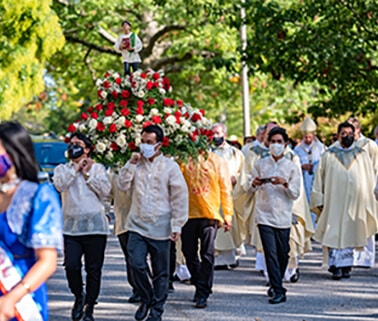
REIMAGINE together the Catholic Church’s ministry and presence in and around Baltimore City.
Since the late 18th century, the Archdiocese has been firmly rooted in Baltimore City. While much has changed since the Diocese of Baltimore was established as the Premier See in 1789, our mission remains unwavering. As disciples of Jesus, we are called to share the Good News that through his Spirit, Jesus lives in those who believe, and reaches into our world with his saving message and healing love.
Looking at the immense physical, psychological, and spiritual needs all around us, we are easily overwhelmed and are tempted to think that all this is beyond us. It is a wall we cannot scale, a mountain we cannot climb. The temptation is to take refuge in a safe environment of our own making, to create for ourselves a space where we feel comfortable amid the turmoil.
As a church, we cannot insulate ourselves from the realities we face today, rather we must find ways to meet the needs of those in our communities.
Seek the City will allow us to reimagine our presence and ministry in new, creative, and more effective ways.
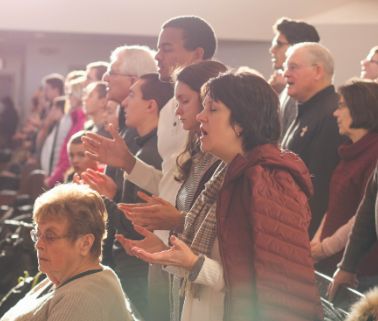
REASSERT strengthen, and adapt pastoral ministry, evangelization, and outreach in Baltimore for the 21st Century, by following “A Light Brightly Visible.”
Christ’s light continues to burn brightly in each of us, in our families and His light finds a primary place in our parishes. Pope Francis refers to the parish as “a family of families,” thus instructing us that the stronger and more vibrant our Catholic families are, the stronger and more vibrant our parishes and outreach will be. Therefore, we must nurture and share this light we have been given. All too often, the task of evangelization is left to the so-called experts, but the authentic renewal of our parishes demands the engagement of every layperson.
In 2012, building on the theology of the Second Vatican Council, Pope Benedict XVI made an extraordinary statement: “Co-responsibility demands a change in mindset especially concerning the role of lay people in the Church. They should not be regarded as “collaborators” of the clergy, but, rather, as people who are really “co-responsible” for the Church’s being and acting (1).”
Only when we work together as a local church does the mission of evangelization truly succeed. As we move forward with this process we must assess, reassert, strengthen, and adapt our pastoral ministry, evangelization, and outreach to better meet the needs we encounter today and will face in the future.
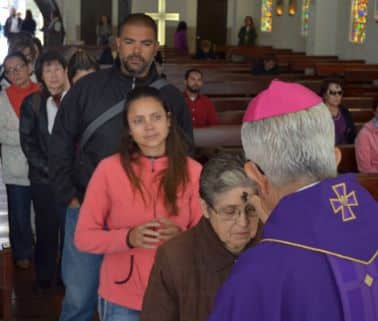
REALIGN pastoral, human, financial and facility resources effectively with current and future pastoral, spiritual, and evangelization needs.
Many of our parishes find themselves directing increasing portions of their resources on facilities. The unintended consequence is that facilities are making decisions for us, and we find ourselves having less means to direct towards staffing pastoral needs. Meeting the needs of today’s congregations may require more, different, and/or less space than yesterday. New ministry models going forward may require new structures and collaboration we have not previously enjoyed.
Ultimately, we must ensure our space supports, rather than distract from, pastoral ministry and evangelization
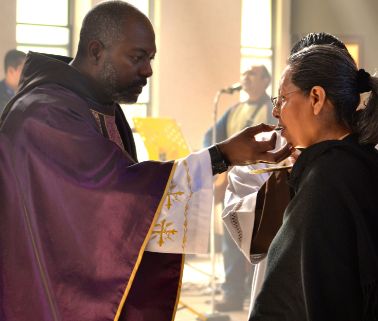
RE-ENGAGE and attend to the pastoral and evangelization needs of historical and diverse communities and generation cohorts.
The Archdiocese of Baltimore has a rich history of different cultural expressions of Catholicism. At the same time, we know all have not experienced the same sense of welcome, in fact, sadly some been marginalized and have faced exclusion even from the very church they love.
If we truly hope to evangelize, that is, to extend the Gospel message to every person within our parishes, then we must cleanse our communities of every vestige of racism. This is something we must do, not because it is in vogue or because there has been unrest in our streets, but rather, because Jesus Christ has revealed the inviolable dignity of each person and he calls us to foster the common good both in our Church and in the wider society.
We need to pay close attention to the young people who still frequent our parishes. As Pope Francis said, “A Church always on the defensive, which loses her humility and stops listening to others, which leaves no room for questions, loses her youth and turns into a museum (2).” We need to build up bonds of trust and offer faith-formation opportunities, coupled with outlets to serve the poor and vulnerable. We also need to equip young adults to bear witness to other young people to Christ, “the power and wisdom of God” (1 Cor 1:24) and to the truth and goodness of the faith.
2 Pope Francis, Christus Vivit, No. 41.
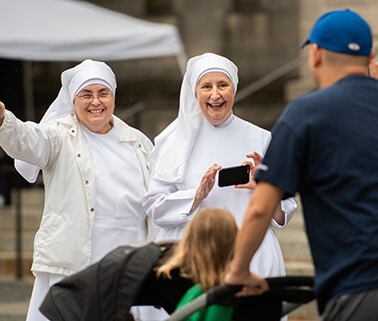
REVITALIZE and be thoughtful stewards of the resources of the faithful to support welcoming, worshiping communities of faith, hope, and love.
The US Bishops in their pastoral letter Stewardship: A Disciple’s Response, reminds us that being “a disciple of Jesus Christ leads naturally to the practice of stewardship.” As good stewards, we are called to not only receive the gifts God generously give us, but to cultivate and share them in justice with those in need. Seek the City to Come invites us to be good stewards of our archdiocesan resources, and just as we are called to use the gifts we have been given personally, we have a similar responsibility to properly steward our collective resources.
Today, now, is the time for us to carry out the Lord’s mandate to spread the Gospel as widely and deeply as possible. While we rightly speak of the Kingdom of God as “already” inaugurated but “not yet” fulfilled, nowhere does the Church’s Tradition speak of a “not now!” Rather, “This is the acceptable time; this is the day of salvation” (2 Cor 6:2).
Want to Get Involved?
Check out Seek the City to Come events near you.

Sign Up for Updates!
Notifications